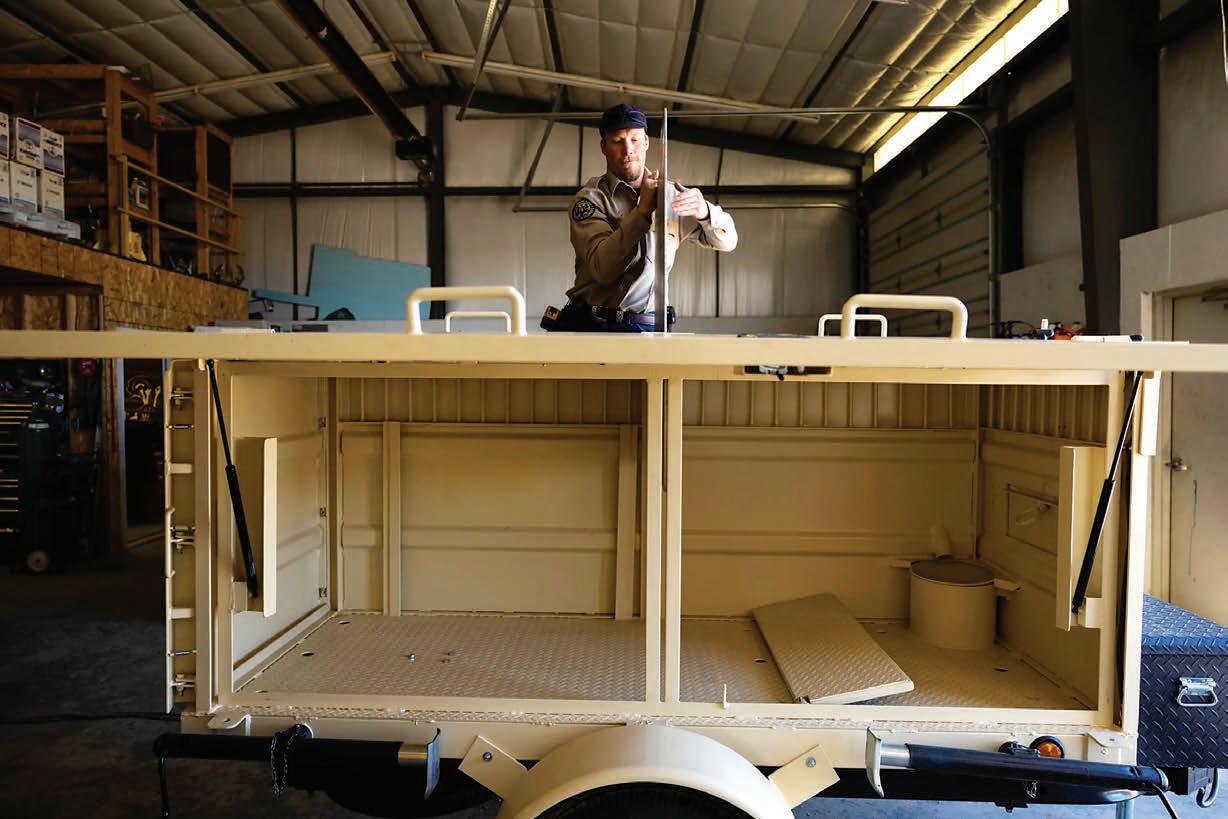
7 minute read
Some Thoughts on War & Peace As Rita and I Vacation in Eastern Europe
As I write this on Sunday evening, Rita and I are midway through our cruise of the Danube River from the Black Sea to Vienna. We just had a home visit and meal with four other couples at a home in Croatia. Our hostess earns extra money by hosting such tourist visits.
Her home was largely destroyed during the SerboCroatian War of the early 1990s, but they rebuilt it, with minimal help from their government. During the conflict itself they evacuated to another country. I remember those years well and tried to imagine what it would have been like if they had included such a situation for us.
We were already feeling blessed to live in the Denver area, spared from the tornados, hurricanes, mudslides, floods, and earthquakes afflicting fellow Americans, but being bombed and having to rebuild entire cities — that’s something altogether different. Our guide told us that 91% of the buildings in the city where our ship docked, were destroyed. We saw many buildings that still showed damage from the war.
And we can’t forget that a few hundred miles to the east of where Rita and I are, whole cities, including homes, hospitals and schools, are being flattened by Russian artillery.
Yes, we “lucked out” choosing to be born in America and choosing to relocate to Colorado. But we can’t forget the suffering of those — in America and elsewhere — who have suffered and continue to suffer.
Preparing for the Biennial Property Tax Appeal Process
Nobody likes taxes, but our Colorado property tax system is, in my opinion, among the fairest in the nation, so as we brace ourselves for the “Notice of Valuation” we’ll receive early next month, I thought it useful to describe how it works and why I believe it to be relatively fair.
A 2022 post on the website Investopedia.com ranked Colorado as having the 5th “best” (i.e., lowest) property tax in the nation, behind Hawaii, Alabama, Louisiana and Wyoming. It calculated that the state’s “effective property tax rate” was 0.51% of a home’s valuation. Hawaii was lowest at 0.31% and New Jersey was highest at 2.31%.
However, that statewide average does not include the impact of metropolitan tax districts, which can nearly double the tax rate on a given home. (This is a huge scandal which is only recently beginning to get the attention of legislators, who could rein in their abuses if they choose.)
Putting aside that scandal for a moment, let me describe how property taxes are calculated in Colorado, as mandated by Colorado’s constitution.
The essence of the system is to have the county assessor determine the fair market value — that is, what every property could have sold for based on what comparable homes sold for — on June 30th of every even numbered year. That means that the valuation you receive in the mail next month will be what the county assessor’s computer program believed your house (as it is known to exist by the assessor) could have sold for on June 30, 2022.
That’s an unfortunate date this time around, because June 2022 may well have been the peak of the recent run-up of home prices in Colorado and nationwide.
An important note: Although the valuation date is June 30th, it applies to what your house looked like on January 1st of the tax year. That made a big difference for victims of the Marshall Fire, because their home was worth next to nothing on Jan. 1, 2022, so the tax bill they received this year covering 2022 should have been close to zero dollars, not a repeat of their 2021 tax bill. If the fire had not destroyed their home, the valuation of it on June 30, 2020, would have applied to property taxes for both 2021 and 2022.
Getting back to the process, once the valuation on your home is finalized following any appeal you might make, your tax for this year and next is determined by applying your home’s mill levy to the assessed valuation, which is 6.95% of your home’s full valuation.
Thus a million-dollar home has an assessed value of $69,500, so if your mill levy is 100, then your tax bill would be $6,950. (It’s called a mill levy from the latin word for thousand, so the levy is applied to every thousand dollars of assessed value. Thus, 100 x 69.5 = 6,950.)
Keep in mind when you appeal your valuation that every $10,000 in reduced full valuation is worth $695 in reduced assessed valuation. At a mill levy of 100, a full value reduction of that amount reduces your tax bill by only $69.50. That may not be worth arguing for, but a reduction of $100,000 would be worth $695.00. And if you’re in a metropolitan tax district with a high mill levy, it’s worth even more. Expect more on this topic in coming weeks.
As “baby boomers,” Rita and I are only a few years shy of being old enough to have lived through World War II. We didn’t personally experience it, and we were raised to believe that such devastation and military action was a thing of the past. But we have seen too much “conventional warfare” elsewhere and should realize that we are indeed exceptional as a nation for being spared it.
Last week we spent a day in Belgrade, the capital of Serbia and the former capital of Yugoslavia. Located strategically at the confluence of two rivers, making it the crossroads for the separation of western and eastern Europe, it has been fought over through the centuries so many times that it has been destroyed and rebuilt no less than 40 times. Although it holds the “prize” in that regard, it is by no means alone in being destroyed by war multiple times. Can you imagine such a city being your home?
If you, like me, had thought that the wartime destruction/rebuilding cycle had been broken, you and I only need to look at what Vladimir Putin has accomplished in Ukraine, leveling multiple cities and towns, committing verifiable war crimes by targeting residential areas, hospitals, churches and schools.
But shouldn’t war itself be considered a “war crime”? We’d like to hope that Putin is the last monomaniacal leader to believe he is justified in invading and leveling another sovereign nation.
The creation of the European Union and the Euro Zone, plus the expansion of NATO gives hope that European countries, at least, will not go to war with each other ever again.
Meanwhile, with the increased political division in our own country and the use of “civil war” language on the far right, should we worry that those millions of assault weapons in our citizens’ personal arsenals might someday be used against perceived domestic enemies? Even posing that question would have been unthinkable a decade ago, but now it’s an increasing topic of serious discussion.
I wish more Americans could come to Eastern Europe or at least Western Europe to meet the people who have experienced the stupidity — and crime — of warfare at home. We have seen similar devastation from tornadoes in other parts of America, but imagine if those same scenes of devastation had been created by Americans attacking each other?
Please, let that not be our future!
Price Reduced on Golden Home With Views!
$1,494,000
This solar-powered home at 359 Canyon Point Circle was a model home for the Village at Mountain Ridge, the subdivision west of Highway 93 backing to the Mt. Galbraith Park. (There’s a trailhead to the park’s 5 miles of hiking trails within the subdivision.) The seller has made many improvements to the home since buying it in 2002, including a total renovation of the gourmet kitchen and master bathroom, plus adding 11.5 kW of solar panels, which meet all the electrical needs of the home. The main-floor deck was also completely rebuilt with composite decking, metal railings and a breakfast bar for enjoying the sunrises over South Table Mountain and the City of Golden, which are visible even from the walk-out basement. A walking path near this home allows children to walk safely to Mitchell Elementary School via a pedestrian bridge that crosses the highway. To appreciate all the features of this 4,106-sq.ft. home, take the narrated video tour at www.MountainRidgeHome.com, then call your agent or Jim Smith (below) to see it!
Jim Smith
Broker/Owner, 303-525-1851
Jim@GoldenRealEstate.com
1214 Washington Ave., Golden 80401
Broker Associates:
JIM SWANSON, 303-929-2727
CHUCK BROWN, 303-885-7855
DAVID DLUGASCH, 303-908-4835
GREG KRAFT, 720-353-1922
AUSTIN POTTORFF, 970-281-9071 en, last summer, City Council de ned retail marijuana as any nonmedical marijuana dispensaries and limited their locations based on proximity to schools, parks and other dispensaries. us, potential locations for licensees were limited to Canyon View Business Park in northwest Golden, the Coors Technology Center Park to the northeast, the Interstate 70 exit 259 area to the southwest, and along stretches of Colfax Avenue and U.S. Highway 6 in south Golden. e state’s Marijuana Enforcement Division has a social equity or accelerator program that “acknowledges the e ects of decades of criminal enforcement of marijuana laws on communities of color,” according to the state website. is social equity program works to include cannabis professionals who may have faced barriers to entry in Colorado’s retail marijuana industry.

City Council also allowed up to four retail marijuana licenses, with one set aside for a social equity licensee based on state criteria.
Since passing the ordinance last summer, Golden received ve retail marijuana applications, including one social equity applicant.
Steve Glueck, assistant to the city manager, explained how one of the ve was deemed ineligible because it was within 1,000 feet of another applicant. So, the city went ahead with the four eligible applicants, with Glueck adding that Golden would’ve conducted a lottery if it had received more.
Verts Neighborhood Dispensary is now open with the other three in the nal stages. Glueck said licensing approval is only contingent on their nal site improvements and inspections with the city and state.
Excise tax revenues
With the dispensaries starting to open, Golden will soon be collecting 6% excise taxes on their sales. Along with an estimated $250,000 in revenues for 2023, the city has budgeted for $600,000 in 2024, Glueck con rmed.
City Council has intended to use these funds for public health resources, including those substance abuse recovery, mental health, food insecurity and housing insecurity. Right now, Golden’s only made one commitment with the excise tax revenues — $100,000 to the Hunger Free Golden collaborative. Of that, Glueck said, the city’s already paid $30,000, which is about how much the city’s made from the licensing application fees.
During the City Council meet-










